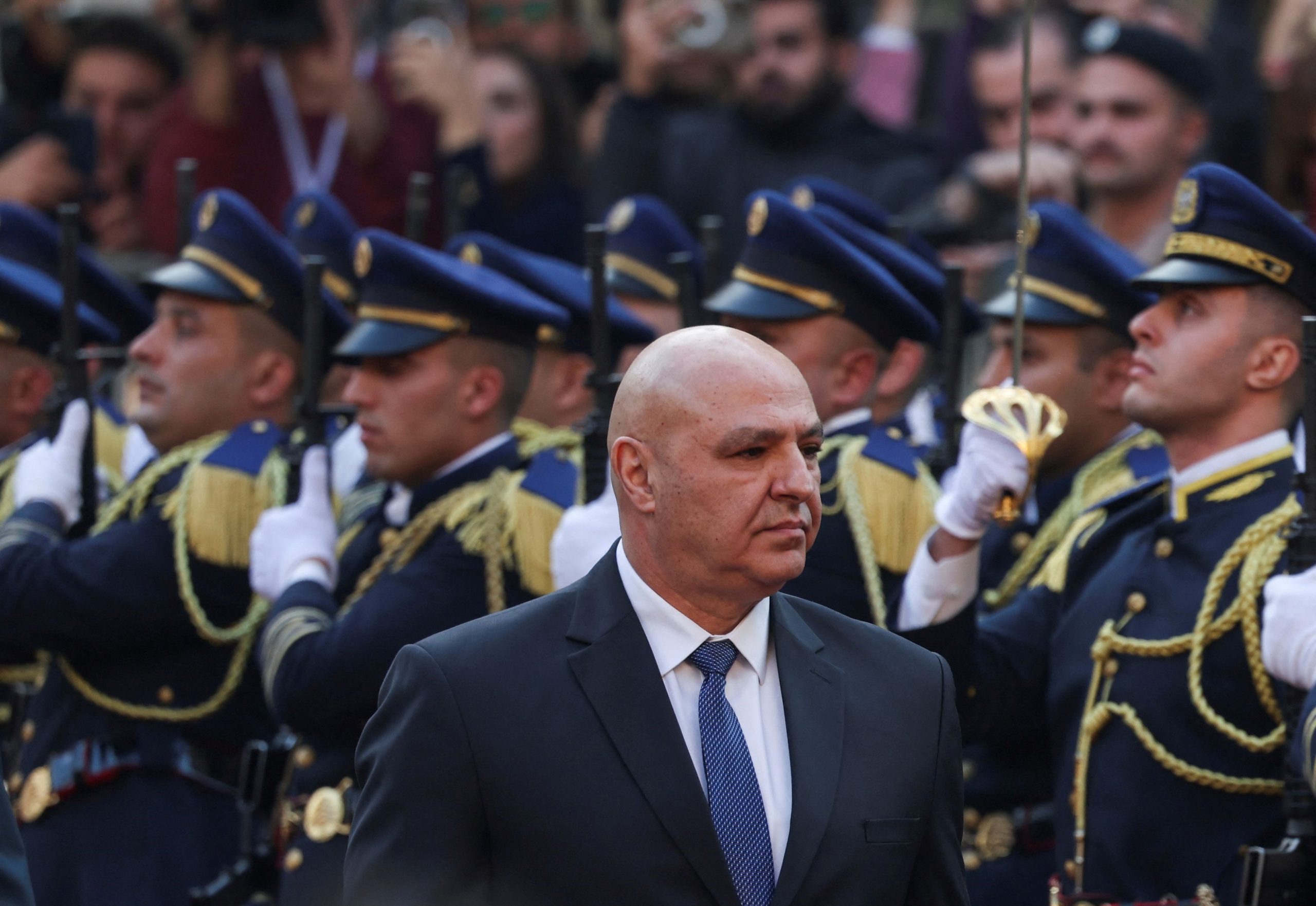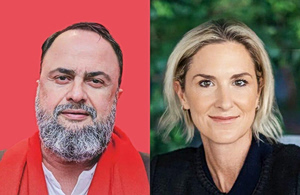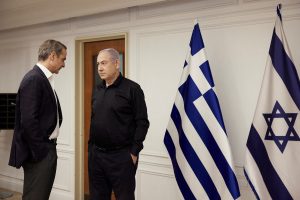Lebanon’s Parliament elected a U.S.-trained general as president, ending a two-year vacancy in a sign of Hezbollah’s waning influence following a bruising war with Israel and the weakening of the group’s Iranian patron.
After obstructing the election of any other candidate by withdrawing from a dozen previous sessions and thus depriving Parliament of quorum, Hezbollah and its allies voted in favor of Gen. Joseph Aoun as the country’s next president on Thursday, according to a Hezbollah lawmaker. Ninety-nine out of 128 members of Parliament voted for Aoun in the second round of voting, according to the Parliament speaker. In the first round, Hezbollah didn’t vote for Aoun, which it said was a message that its consent was still needed.
Aoun, who has headed the Lebanese military since 2017, takes power as the country looks to pick up the pieces from Israel’s intensive bombardment and invasion of parts of southern Lebanon that it launched in response to Hezbollah’s attacks.
“I pledge to execute my role as the head of the armed forces to insist on the right of the state to have a monopoly over weapons,” Aoun told Parliament upon being elected.
Hezbollah’s Lebanese rivals oppose its use of force outside the law and accuse it of undermining or co-opting state institutions. Hezbollah says its weapons are needed to confront Israel and protect Lebanon, whose national military headed by Aoun is relatively weak.
Lebanon’s lack of a president has left it with a caretaker government, a vacuum that has worsened the country’s five-year-old economic crisis, which the World Bank says is one of the world’s worst in the past 150 years. Government institutions were already hollowed out by years of corruption and political deadlock. The national army, which receives some aid from the U.S. , was weaker than Hezbollah before last year’s war.
Lebanon’s main political parties had been unable to agree on a new president since the previous leader left office at the end of his term in 2022. The Biden administration began pushing last year to take advantage of Hezbollah’s weakening from Israeli attacks to break the political impasse, a move that some Arab governments rejected as unrealistic and dangerous.
U.S. special envoy Amos Hochstein , who visited Lebanon this week to support Aoun, called his election “a step toward peace, security and stability.”
Hezbollah, a Shiite Muslim militia and political party, and its allies had previously blocked the election of any candidate they didn’t back. The group was founded with Iranian backing in response to a previous Israeli invasion of Lebanon in 1982, eventually becoming the country’s dominant armed force and indispensable political player.
The peak of Hezbollah’s power inside Lebanon came around 2016, when it imposed its choice as president , Michel Aoun , who is unrelated to the new leader. That was the first time the Shiite group tipped the balance in filling the post, which under longstanding political agreements is always filled by a Maronite Christian, while the prime minister is a Sunni and the Parliament speaker is a Shiite.
But last year, Israel eliminated much of Hezbollah’s senior leadership , deployed booby-trapped pagers that killed and wounded thousands of members , and heavily bombed areas where the group had support and a strong presence, especially in Lebanon’s south and east.
Hezbollah’s might has also been diluted by the decline of Iranian influence across the region, including last month’s toppling of Syrian dictator Bashar al-Assad , whom Tehran and Hezbollah had helped prop up for years. Syria’s military intervened in Lebanon’s civil war in 1975 and then occupied the country until 2005, by which point Hezbollah was ascendant.
Israel, Iran and Saudi Arabia, which has historically used its oil wealth to help shape Lebanon’s political and economic trajectory, congratulated Lebanon on filling the presidential vacancy.
Hezbollah’s declining status in Lebanon has been seen in other ways, besides the presidential election, in which the group’s preferred candidate, Suleiman Frangieh, dropped out at the last minute and threw his support behind Joseph Aoun, who is 60.
In December, three pro-Hezbollah activists were detained following a lawsuit brought against them by a local television channel accusing them of defamation and intimidation. Lawmakers from the group, which has long used its influence to quietly shield members from prosecution by the state, were forced to protest outside state-security agencies to secure the men’s release. A senior lawmaker, Ibrahim Mousawi, was even denied entry to the protest by security forces.
Last week, passengers arriving in Beirut on an Iranian commercial plane were thoroughly inspected after Lebanese authorities suspected the flight was transporting money for Hezbollah, according to Lebanese authorities. Interior Minister Bassam Mawlawi defended the inspection as routine and emphasized that Lebanese airport security would address any attempts to smuggle illicit funds into the country.
There are also signs of discontent inside Hezbollah’s own support base, with some people complaining on social media about the paltry checks they have received from the group to help rebuild homes destroyed by Israeli bombardment.
Israel’s campaign killed thousands of people and temporarily displaced more than a million people , according to Lebanese officials. It came in response to Hezbollah firing rockets and missiles at Israel in support of Hamas in Gaza. Israel said it needed to push Hezbollah away from the border so that tens of thousands of people could feel safe returning to their communities in northern Israel.
A cease-fire deal in November that calmed months of cross-border bloodshed has been strained by alleged violations on both sides. Under the terms of the agreement, Israeli forces are supposed to pull out completely in less than three weeks and be replaced by Lebanese army troops under Aoun’s control.
While Hezbollah has been diminished, it maintains lethal powers and the ability to intimidate its Lebanese rivals, a senior U.S. diplomat said last week.
“They won’t cede their coercive powers easily, but their avenues of support have been steadily attrited,” the diplomat said. “Iran is not the colossus bestride the region that it appeared to so many people as it was two years ago, and all of that is having a knock-on effect on Hezbollah…And the shift in Syria itself I think is going to just cause a series of waves that rock their diminished boat.”
What remains of Hezbollah has lost the veto power that it exercised over Lebanese politics for the last 20 years, said Rym Momtaz, a security analyst at the Carnegie Endowment for International Peace, a think tank in Washington.
“The Lebanese political parties have an historic opportunity to break away from decades of Syrian-Iranian dictates. But in order for them to be successful, they also need to understand that there’s a need for very deep reforms and that things can’t go on the way they had,” said Momtaz.
Aoun, who successfully confronted Islamic State and an al Qaeda affiliate in Lebanon a decade ago, takes over at a precarious moment. Anyone seen as taking power as a result of Israel’s attacks on Lebanon could face blowback from the Lebanese public and rival political forces, political analysts and diplomats said.
Analysts say Aoun gained popularity among many Lebanese for his handling of Islamist militancy at the height of the Syrian civil war next door and later on for permitting protests against the political elite in 2019. He also has good relations with the U.S., France and Saudi Arabia—historically some of Lebanon’s biggest donors.
There are also fears that efforts by other Lebanese parties to disarm Hezbollah could lead to internecine fighting in a country that suffered a debilitating 15-year war ending in 1990. Many of the country’s political factions are led by former warlords from that conflict.
Renewed civil war is unlikely, according to analysts, but clashes and instability remain a real possibility.
“The fear factor persists, even though they are dramatically weakened,” said David Schenker, who was the State Department’s top Middle East official under the first Trump administration. “There’s also a concern about Hezbollah’s resurgence, that they’re going to come back somehow,” said Schenker, now a fellow at the Washington Institute for Near East Policy.
Write to Stephen Kalin at stephen.kalin@wsj.com
Corrections & Amplifications undefined Joseph Aoun is a general in the Lebanese army. An earlier version of this article incorrectly said he is a brigadier general. (Corrected on Jan. 9)



